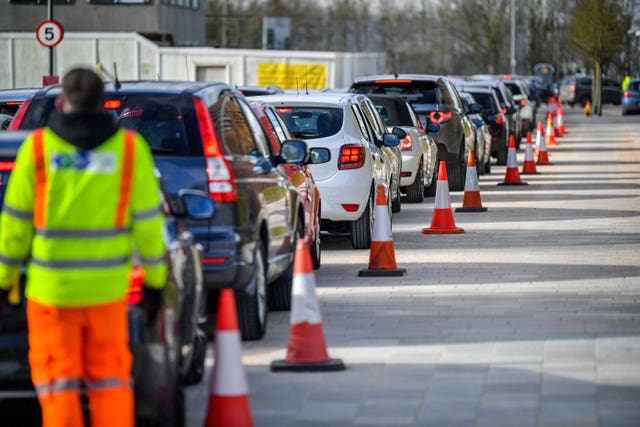
Surge testing will take place in South Gloucestershire after cases of the Manaus variant of coronavirus – a new strain that may spread more rapidly and may respond less well to existing vaccines – were discovered.
Residents who live in five postcode areas, who are aged over 16 and do not have symptoms of Covid-19, are invited to come forward for testing.
People who travel into the areas – BS32 0, BS32 8, BS32 9, BS34 5 and BS34 6 – for work or to visit someone they are in a support bubble with are also able to have a test.
The identified postcode areas fall within Bradley Stoke, Patchway and Little Stoke – and are different to those who were part of the previous community surge testing programme in February.
A new variant of Covid-19 has been found in #SouthGlos
To help us find out more about this variant, we have launched symptom-free community surge testing for the following postcodes:
‼️ BS32 0, BS32 8, BS32 9, BS34 5, BS34 6 ‼️ pic.twitter.com/TB8MWVP0DX
— South Glos Council (@sgloscouncil) February 28, 2021
That testing followed identification of the Bristol variant and authorities say there is no connection between the two programmes.
Drive-in surge testing sites will be open at Stoke Gifford Parkway Park & Ride, as well as The Mall Coach Park at The Mall Cribbs Causeway from 9am on Monday.
A range of community-based locations, where residents can walk-in to collect a test kit, take it home and complete it there then return it for processing, will also be open from Monday.
The programme is expected to run for one week, ending on March 7, with the facilities open each day.
Sara Blackmore, director of Public Health at South Gloucestershire Council, urged people who were invited to come forward and take a test.
“We are keen that all South Gloucestershire residents in the postcode areas identified take part in this testing, which will help us to identify positive cases and prompt self-isolation, which helps to break the chain of transmission,” she said.
“We do recognise the challenge for residents of undertaking another additional testing programme and want to thank you in advance for your patience and support as we continue to work together to protect our communities from Covid-19.
“We are working together with local and regional health partners, Public Health England and NHS Test and Trace, to deliver this swift, safe and co-ordinated response, with an enhanced community testing offer available to people in and around areas where this variant has been discovered.”

The surge testing is in addition to testing for people who have symptoms, and regular rapid asymptomatic testing for essential workers.
Ms Blackmore said it would “enable closer monitoring” and work to reduce further transmission of Covid-19.
“Even though we have a national road map to recovery from Covid-19, it is vital that we continue to follow the advice, which remains the same to everyone,” she added.
“Behave as if you are carrying the virus, stay in and only leave home if you must.
“Do not mix socially outside of your household and continue to observe public health guidance – hands, face, space. If you are invited to receive a vaccine, please do so.”
People will be able to collect tests from Little Stoke Community Centre and Patchway Community Centre from Monday.
Two additional sites will open at Bradley Stoke Jubilee Centre and Baileys Court Activity Centre from Tuesday.
#Breaking Public Health England said officials have identified the first UK cases of the Manaus variant of coronavirus first detected in north Brazil, a new strain that may spread more rapidly and may respond less well to existing vaccines pic.twitter.com/pcA8T5yvza
— PA Media (@PA) February 28, 2021
South Gloucestershire Council confirmed that any positive tests would be followed up with genome sequencing to identify the precise strain of Covid-19 in each case.
The testing will use PCR tests, which are analysed in laboratories, rather than lateral flow tests.
Mike Wade, deputy regional director for Public Health England South West, said: “All viruses mutate over time and since the start of the pandemic over 4,000 mutations have been identified in the UK.
“Most are not a concern for scientists, but we know that some mutations result in virus variants that we are keen to track more carefully.
“In the South West we’re working with NHS Test and Trace and local authority public health teams on tailored intervention measures for variants.
“These include more testing, additional genomic sequencing and enhanced contact tracing, enabling us to quickly identify any further cases and help prevent any onward spread.”
Three cases of the variant of concern first noted in Manaus, Brazil – known as the P.1 strain – have been identified by Public Health England.
Two are from one household in South Gloucestershire with a history of travel to Brazil. The third is a currently unlinked case in England.
The cases in South Gloucestershire were rapidly followed up by Public Health England’s health protection team, with their contacts identified and tested.
A spokesman for the council said the case that had travelled to Brazil has been “isolating at home with their household” since returning to the UK.


Comments: Our rules
We want our comments to be a lively and valuable part of our community - a place where readers can debate and engage with the most important local issues. The ability to comment on our stories is a privilege, not a right, however, and that privilege may be withdrawn if it is abused or misused.
Please report any comments that break our rules.
Read the rules here